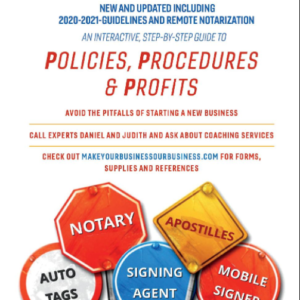
Becoming a notary public involves meeting specific requirements and completing certain steps, which can vary by state or country. Here is a general guide on how to become a notary public in the United States:
Meet Eligibility Requirements:
- Age: Typically, you must be at least 18 years old.
- Residency: You must be a legal resident of the state where you are applying or, in some cases, a non-resident who works in the state.
- Background: Have no felony convictions or crimes involving moral turpitude.
Complete a Notary Application:
- Obtain the notary application from your state’s commissioning authority, often the Secretary of State’s office.
- Fill out the application form with the required personal and professional details.
Take a Notary Training Course (if required):
- Some states require applicants to complete a notary training course. This course covers the responsibilities and duties of a notary public.
- Training can often be completed online or in person through approved providers.
Pass the Notary Exam (if required):
- Certain states require passing a notary exam that tests your knowledge of notary laws and procedures.
Submit Your Application and Fee:
- Submit the completed application form along with the required application fee to the commissioning authority.
- Fees vary by state but typically range from $20 to $100.
Obtain a Notary Bond (if required):
- Some states require a notary bond to protect the public from errors or misconduct. Bond amounts vary, commonly ranging from $5,000 to $15,000.
- Bonds can be obtained through insurance companies or bonding agencies.
Receive Your Notary Commission Certificate:
- Upon approval of your application, you will receive your notary commission certificate from the state.
Purchase Notary Supplies:
- Notary Seal/Stamp: Required for notarizing documents.
- Notary Journal: Some states require keeping a record of all notarizations performed.
File Your Oath of Office and Bond (if required):
- In some states, you must file your oath of office and bond with a county clerk’s office within a specified period after receiving your commission.
Begin Performing Notarial Acts:
- Familiarize yourself with your state’s notary laws and guidelines to ensure you perform your duties correctly and ethically.
State-Specific Resources
- California: The California Secretary of State’s website provides detailed instructions on becoming a notary, including training and exam requirements.
- New York: The New York Department of State offers information on notary qualifications and the application process.
- Texas: The Texas Secretary of State provides resources for notary applicants, including application forms and educational materials.
Additional Tips
- Continuing Education: Some states require notaries to complete continuing education courses to renew their commission.
- Renewing Your Commission: Stay aware of your commission expiration date and follow your state’s process for renewal.
For the most accurate and detailed information, consult your state’s notary public handbook or the official website of your state’s commissioning authority.
Daniel C. Lewis resides in Carmel, IN. He was named in 2010 Notary of the Year by the National Notary Association. He was also named in the same year an Honorary Secretary of State by the Indiana Secretary of State. Daniel is currently serving as the Executive Director of the Lewis Notary & Training Services Inc. Daniel is an entrepreneur, writer, video editor, and Keynote Speaker.
Other Post by this author….
- Overcoming Distractions During a Notary Assignment: 7 Proven Strategies for Notary Success
- 5 Must-Have AI Tools for Notary Entrepreneurs Should Use Today
- How to obtain an Indiana Title Producers License for Notaries
- What to do in Quarter II for Notary Entrepreneurs
- Do’s and Don’ts of Marketing for Notary Entrepreneurs



